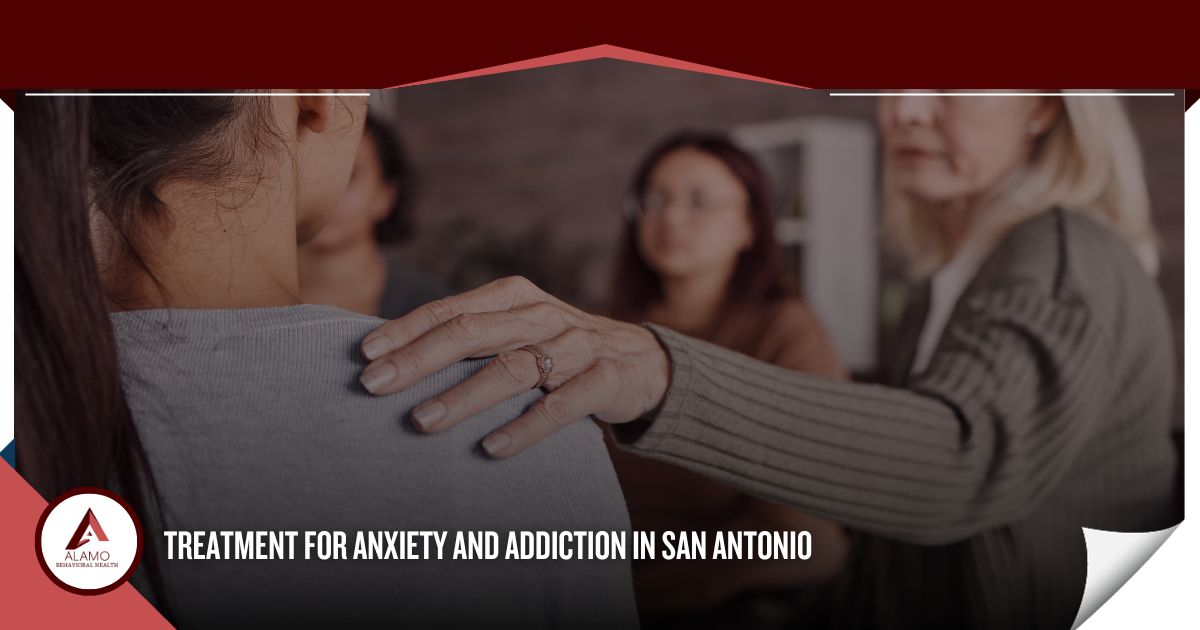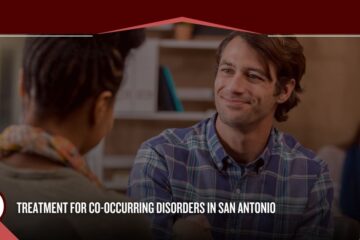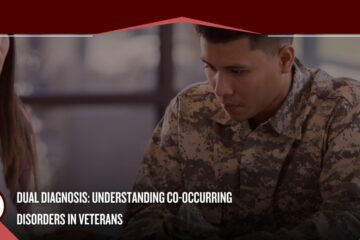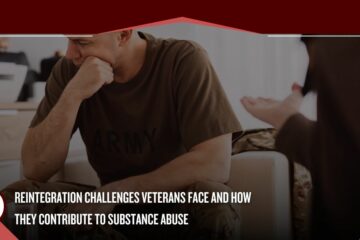 Addiction is a chronic and complex disease that often occurs when individuals have underlying mental health conditions that cause them to self-medicate. When someone has a mental health condition and a substance use disorder, this is known as having co-occurring disorders.
Addiction is a chronic and complex disease that often occurs when individuals have underlying mental health conditions that cause them to self-medicate. When someone has a mental health condition and a substance use disorder, this is known as having co-occurring disorders.
According to the Substance Abuse and Mental Health Services Administration (SAMHSA), “approximately 9.2 million adults in the United States have a co-occurring disorder.”[1]
One of the most common mental health conditions to co-occur with addiction is anxiety disorders, mainly because they are the most prevalent mental illnesses in the United States. If you have co-occurring anxiety and addiction, you must receive treatment for both conditions at the same time.
What Types of Anxiety Disorders Co-Occur With Addiction?
While everyone deals with anxiety or stress at some point in their lives, people with anxiety disorders deal with symptoms daily. Oftentimes, anxiety disorders cause people to experience distress or fear even during seemingly mundane tasks, making it difficult to cope with everyday life. As a result, they may begin to abuse substances to mask their symptoms, leading to the development of addiction.
The common types of anxiety disorders to co-occur with addiction include:
- Generalized anxiety disorder (GAD)
- Social anxiety disorder (SAD)
- Panic disorder
- Agoraphobia
- Specific phobias
- Separation anxiety disorder
- Obsessive-compulsive disorder (OCD)
- Post-traumatic stress disorder (PTSD)
Co-occurring post-traumatic stress disorder and addiction are extremely common among veterans. According to the U.S. Department of Veterans Affairs, about 1 out of 3 veterans seeking addiction treatment also have post-traumatic stress disorder (PTSD).[2] Thankfully, dual diagnosis programs like Alamo Behavioral Health can provide veterans with the type of support and tools they need to regain control over their lives.
How are Co-Occurring Anxiety and Addiction Treated in San Antonio?
Anxiety and addiction can be incredibly difficult to cope with, as the symptoms of one condition can exacerbate the other. As a result, it’s best to obtain a whole-person approach.
Assessment and Diagnosis
When you first arrive at an anxiety and addiction treatment center in San Antonio, you will undergo initial physical and psychiatric assessments that help the clinical team create an individualized treatment plan. These assessments will gather information about your substance abuse, mental health, physical health, and family history. Rather than using a one-size-fits-all approach, you will receive services specific to your needs and goals for recovery.
Medical Detox
After your initial assessments, you will begin medical detox, which is always the first step in addiction recovery. Because your brain and body are dependent on a substance, you will experience symptoms of withdrawal. Medical detox provides you with the medications and treatments necessary to keep you comfortable, and safe, and limit your symptoms.
The types of medications used during medical detox will depend on what substance you are abusing. Opioids and alcohol are often treated using medication-assisted treatment medications, while substances like amphetamines require symptoms-specific drugs.
Evidence-Based Therapies
After you are completely detoxed, you will begin therapy for your anxiety condition and substance use disorder. The types of therapy you engage in will be evidence-based and clinically proven to help you manage both of your conditions. Additionally, you will participate in both individual therapy and group counseling.
Evidence-based therapies used during anxiety and addiction treatment in San Antonio include:[3,4]
- Cognitive behavioral therapy (CBT)
- Dialectical behavior therapy (DBT)
- Motivational interviewing (MI)
- Contingency management (CM)
- 12-step facilitation therapy
- Family behavior therapy
- Psychoanalysis
- Group psychotherapy
Medication Management
In addition to therapy, you might be prescribed anxiety medications to help you manage your symptoms. While not everyone needs medication, it can help balance the chemicals in your brain responsible for any treatment-resistant symptoms you experience. It is important to note that the medications used will be non-habit-forming to ensure your substance use disorder is not triggered.
Types of non-addictive anxiety medications include:
- Selective serotonin reuptake inhibitors (SSRIs)
- Serotonin-norepinephrine reuptake inhibitors (SNRIs)
- Beta-blockers
- Hydroxyzine (Vistaril)
- Buspirone (BuSpar)
- Pregabalin (Lyrica)
- Gabapentin (Neurontin)
Aftercare Services
Lastly, anxiety and addiction treatment programs in San Antonio offer aftercare services that help you maintain recovery after you complete your treatment, so you will continue to have access to services even after you leave the facility.
Examples of aftercare services for anxiety and addiction include:
- Continued therapy and group counseling
- Medication management
- Access to alumni support groups
- Referrals to outpatient or sober living programs
- Recommendations on local support groups to attend
- Case management services like vocational, housing, medical, or legal assistance
Find an Anxiety and Addiction Treatment Center in San Antonio
If you or a loved one deal with co-occurring anxiety and addiction, it’s time to seek help. Alamo Behavioral Health’s dual diagnosis services build a solid foundation that you can trust for the long term.
To learn more about our treatment programs for anxiety and addiction in San Antonio, contact us today.
References:
- The Substance Abuse and Mental Health Services Administration (SAMHSA): Co-Occurring Disorders and Other Health Conditions, Retrieved September 2023 From https://www.samhsa.gov/medications-substance-use-disorders/medications-counseling-related-conditions/co-occurring-disorders
- The U.S. Department of Veterans Affairs (VA): PTSD and Substance Abuse in Veterans, Retrieved September 2023 From https://www.ptsd.va.gov/understand/related/substance_abuse_vet.asp
- The National Library of Medicine (NLM): Evidence-based practices for substance use disorders, Retrieved September 2023 From https://www.ncbi.nlm.nih.gov/pmc/articles/PMC3678283/
- The National Library of Medicine (NLM): Treatment of anxiety disorders in clinical practice, Retrieved September 2023 From https://www.ncbi.nlm.nih.gov/pmc/articles/PMC6829787/



